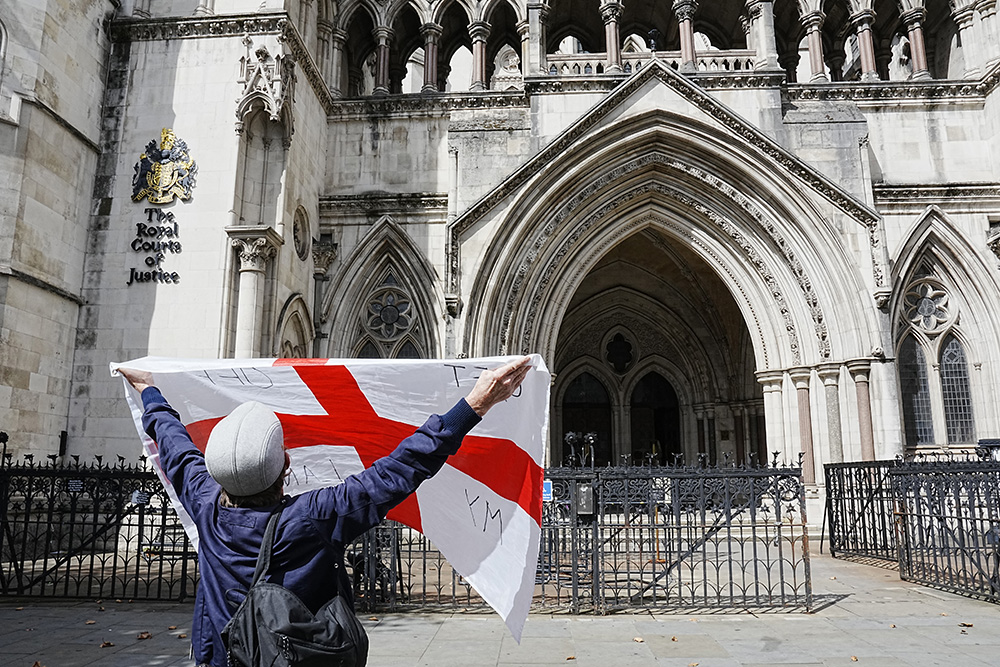UK appeals court lifts ban on housing asylum-seekers in hotel
A three-judge panel ruled the High Court judge who previously imposed a September 12 deadline to remove migrants from the hotel in Epping, northeast of London, had "made a number of errors".
Councillor Ken Williamson from Epping Forest District Council speaks outside the High Court in London, on August 29, 2025, after the government wins it's challenge to a High Court ruling that will stop asylum seekers from being housed at the Bell Hotel in Epping beyond September 12. (Photo by CARLOS JASSO / AFP)
By AFP .
Journalists @New Vision
__________________
A UK appeals court on Friday overturned a lower court decision temporarily blocking the use of a protest-hit hotel to house asylum-seekers, handing a badly-needed victory to the government.
A three-judge panel ruled the High Court judge who previously imposed a September 12 deadline to remove migrants from the hotel in Epping, northeast of London, had "made a number of errors".
The case came after a resident at the hotel was charged with sexually assaulting a local girl, sparking weeks of protests that have at times turned violent and re-igniting a bitter national debate on immigration policy.
A protester holds up a St George's cross flag with the slogan "Get Off My Land" written on, outside the High Court in London, on August 29, 2025, as the government seeks to challenge a High Court ruling that will stop asylum seekers from being housed at the Bell Hotel in Epping beyond September 12. (Photo by CARLOS JASSO / AFP)
In overturning the High Court decision from earlier this month, the Court of Appeal judges said it was "seriously flawed in principle", and risked "acting as an impetus or incentive for further protests".
They warned it had ignored the "obvious consequence that the closure of one site means capacity needs to be identified elsewhere in the system".
The ruling means the government will no longer be forced to relocate 138 asylum seekers from the Bell Hotel by September 12, and could scupper local plans to challenge the use of other hotels for such purposes.
Responding to the ruling, the government, which had been facing a logistical headache to find alternative accommodation, repeated its commitment to ending the use of hotels to house asylum seekers before the next election, likely in 2029.
Under a 1999 law, it is legally required to house "all destitute asylum seekers whilst their asylum claims are being decided". The use of hotels soared under the previous Conservative government.
Border Security and Asylum Minister Angela Eagle said in a statement: "We inherited a chaotic asylum accommodation system costing billions."
"We appealed this judgment so hotels like the Bell can be exited in a controlled and orderly way," she said, adding the "number of hotels has almost halved since its peak in 2023".
'Keep going'
Epping Forest district councillor leader Chris Whitbread called for calm, but told Times Radio he was angered by Friday's ruling.
"This is an awful position for the town ... I'm really concerned for the future of the town at the moment," he said.
The case will now go to a full hearing at the Court of Appeal in October.
Conservative Party leader Kemi Badenoch claimed Prime Minister Keir Starmer had put "the rights of illegal immigrants above the rights of British people who just want to feel safe in their towns and communities".
And she urged other councils to "keep going" with plans to turn to the courts to empty hotels in their towns of asylum seekers.
Epping Forest district council launched the legal action, arguing the hotel had become a risk to public safety and its current use breached planning laws.
A 58-year-old woman, a city accountant protesting outside the court, said she was "appalled" by the ruling.
"You cannot put illegal immigrants above the British taxpayer ... What is our government thinking? Does it not care about the people of Britain?" she said, asking not to be identified.
Irregular migration has long been a hot-button issue in the UK, but it came under a renewed spotlight in recent weeks after a resident in the hotel, Hadush Kebatu, was accused of the sexual assault of a 14-year-old girl.
He has denied the charges, which include sexual assault, attempted sexual assault and harassment without violence, and his trial got underway this week.
The protests seen in Epping have spread to other parts of Britain, amid growing frustration at the continued arrival of small boats across the English Channel from France packed with migrants.
More than 50,000 migrants have made the dangerous crossing since Starmer became UK leader in July 2024, fuelling frustration among far-right politicians and the public.
Anti-immigration firebrand Nigel Farage, whose upstart Reform UK is riding high in the polls, has already said councils run by his party would pursue similar legal challenges.
